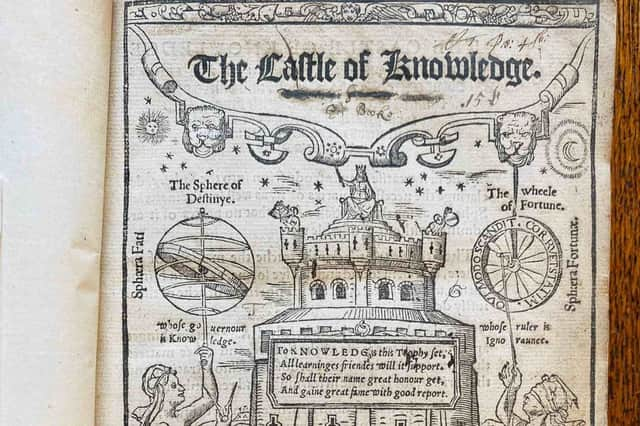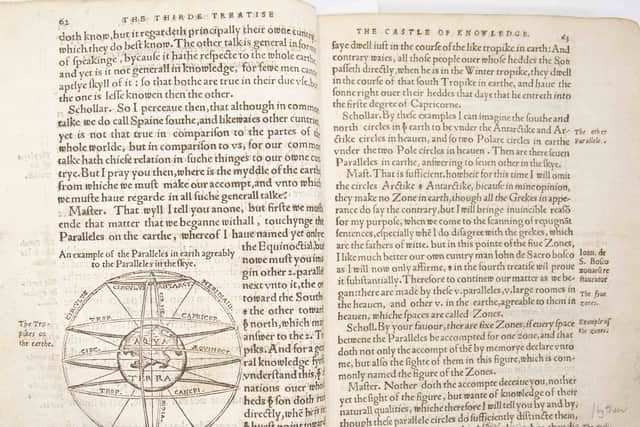First English astronomy book by Welsh author Robert Recorde predates Galileo and could fetch £10K


An 'incredibly rare' astronomy book published 467 years ago was the first to be written in the English language and could fetch a hefty sum at auction. The book - titled 'The Castle of Knowledge' by Robert Recorde - could fetch £10,000 when it goes under the hammer after being found in a box of old books.
The book was first published in 1556 after being written by the Welshman - meaning it came out before Italian astronomer Galileo was even born. It was the first astronomical text to be published in English and is believed to be the oldest surviving example of its kind.
Advertisement
Hide AdAdvertisement
Hide AdThe antique book is now expected to sell for a five figure sum. Jim Spencer, head of books at Hansons, said: “This is an amazing discovery. It might be the most important scientific text I've ever handled. It's the first astronomical treatise to be published in English.
“This book was printed 467 years ago, before many of the major astronomers had even been born, including Galileo (1564-1642), who’s described as the father of observational astronomy, Kepler, Huygens, Newton and Herschel. The vendor consigned a large box full of antiquarian books, and this one jumped out at me with its allegorical woodcut title page and charming illustrations.


"It felt special. A little research quickly revealed its significance and scarcity. The author, Robert Recorde, invented the equals sign, so the equation I proffer for this auction is: important book = big price. I can only find one other copy sold at auction. It fetched $90,000 (£74,200) at Bonhams in 2007.
The same book previously sold at Sotheby’s in 1971. This copy is not as well-preserved, but still incredibly rare. Experts say the book is important for three reasons including being the oldest surviving original English astronomy book, rather than a translation.
Advertisement
Hide AdAdvertisement
Hide AdIt is is one of the first English astronomy books to mention Polish astronomer Copernicus’ De revolutionibus orbium coelestium (On the Revolutions of the Celestial Spheres), and the heliocentric system. Copernicus (1473-1543) formulated a model of the universe that placed the Sun rather than Earth at its centre.
In addition, Recorde not only refers to ancient Greek philosopher Plato but also to fellow Greek philosopher Proclus, so had access to Neoplatonic source material.
Jim added: “Recorde was a brilliant Welsh academic, physician and mathematician whose name should be more widely known. As well as inventing the equals sign (=) he introduced the pre-existing plus (+) and minus (−) signs to English speakers in 1557. And yet many people have not heard of him, partly perhaps because of his tragic end. He died in jail.”
Recorde was born around 1512 in Tenby, Pembrokeshire. He studied at the University of Oxford in about 1525 and was elected a Fellow of All Souls College in 1531. After choosing medicine as a profession, his studies continued at the University of Cambridge in 1545.
Advertisement
Hide AdAdvertisement
Hide AdHe returned to Oxford and taught mathematics. Later he worked in London as a physician to King Edward VI and Queen Mary, to whom some of his books are dedicated. He was also controller of the Royal Mint. But after being sued for defamation by a political enemy, he was arrested for debt and died in the King's Bench Prison, Southwark, in 1558. The book will go under the hammer at Hansons Auctioneers in Staffordshire on Wednesday, November 1.
Comment Guidelines
National World encourages reader discussion on our stories. User feedback, insights and back-and-forth exchanges add a rich layer of context to reporting. Please review our Community Guidelines before commenting.
